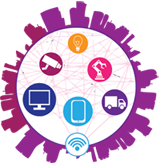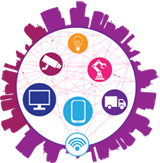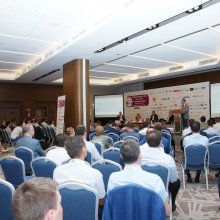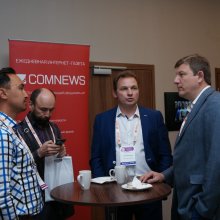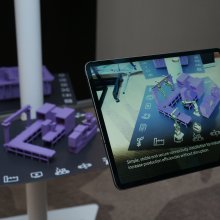About the event
The industry weighed all pros and cons of 5G
On May 30-31, 2019 the Hilton Garden Inn Moscow Krasnoselskaya hosted the 11th International Business Forum “Wireless Russia & CIS: LTE, 5G and Internet of Things”. The event gathered over 200 specialists from domestic and international telecommunication service providers and IoT, developers of digital solutions, regulators, key industry associations, research agencies and the media.
The Platinum Sponsor of Wireless Russia & CIS was Huawei. Ericsson was Silver Sponsor, and Nokia and Ceragon Networks were Bronze Sponsors. MCN Telecom was Session Sponsor. The Forum was also supported by RSCC, Allot Ltd., IskraUralTEL, CompTek and Intracom Telecom. The exhibition conducted as part of the forum featured solutions from Huawei, Ericsson, Ceragon Networks and Anritsu Corporation.
Traditionally, Wireless Russia & CIS Forum 2019 was widely endorsed by a number of high profile organizations, including the Russian Ministry of Digital Development, Communications and Mass Media, the Federal Agency of Communications (Rossviaz), 3GPP, GSA, the LTE Union, the International Telecommunication Union (ITU), the IoT Market Association, International Academy of Communications and CIO Club in the Central Federal District.
The plenary session of the forum, moderated by Anna Bakaykina, Deputy Head of the Department for Sectors of Economy of the Analytical Center for the Government of the Russian Federation, was dedicated to the outlook for 5G/IMT-2020 networks. Sasha Sirotkin, VP 3GPP RAN3 – a task team, responsible for UTRAN/E-UTRAN infrastructure and specification of different interface protocols – offered an insight into 5G standards: 3GPP versions 15, 16 and upwards. Head of the regional office for CIS of the International Telecommunication Union (ITU) Kirill Oparin spoke about international standards for IMT systems on the road to 5G. LTE Union’s consultant Vadim Poskakukhin dedicated his presentation to the priority radio frequency bands for 5G networks and the outlook for their employment. Javier Albares, GSMA’s Head of Innovations in Europe, entitled his report: “5G – a lie or not?” Advisor to Huawei Eurasia CEO Igor Akulinin told the audience about the first attempts at monetizing 5G networks. Ericsson’s VP Anatoliy Ilyaich offered an overview of current outlook for 5G.
The next session, which was moderated by Dmitriy Markov, Director of “Information Infrastructure”, ANO “Digital Economy”, was dedicated to the level of network infrastructure’s readiness for 5G deployment. Dmitriy Sakharchuk, Chief Architect of Rostelecom’s Corporate Center, shared a telecommunications operator’s take on 5G. Sergey Salov, Director of Telecom, Utilities, Communication & Entertainment (TUCE) practices at PwC Russia, entitled his presentation: “5G networks: How to make 5G profitable”. Huawei Eurasia’s Chief MMB Expert Dmitriy Konarev told the audience about simplification of 5G networks and operating expense (OPEX) savings. Lidia Varukina, Head of Technology, Nokia East Europe, spoke about network arrangements to prepare it for 5G. Georgiy Muratov, Ericsson Russia’s lead expert in 5G, spoke about how to ensure the required capacity and coverage for 5G networks. Commercial Director of “YEKATERINBURG-2000” (MOTIV Telecommunications Group) Andrey Zolotarev shared with the audience his company’s experience in building regional infrastructure optimized for 5G.
After lunch, the discussion around the readiness of the infrastructure for the deployment of 5G continued. Alan Hadden, Director of Hadden Telecoms and previous head of the GSA Association, spoke about the reality of 5G and market upgrade all over the world. Lidia Varukina, GSA’s Lead Coordinator for CIS, offered a presentation entitled: “Industry’s views on 5G networks”. Allot’s VP for Product Management and Strategy Artur Zavalkovskiy looked into the possibilities of developing and monetizing secure IoT infrastructure based on operator network. Damir Opsenica from Iskratel shared his views on the advantages of 5G. Vitaliy Shub, Deputy Head of the CE NTI “Wireless Communication Technologies and Internet of Things”, Skolkovo Institute of Science and Technology, touched upon how 5G can help to ensure technological self-sufficiency.
The first day of the forum concluded with a discussion of challenges and opportunities of 5G in Russia across different frequency bands. Panelists included: Deputy Dean of the faculty of Communication Systems, Moscow Technical University of Communications and Computer Science (MTUCI) Taoufik Ben Rejeb, Director General of Spectrum Management Igor Guryanov, Deputy Head of the Department for Sectors of Economy of the Analytical Center for the Government of the Russian Federation Anna Bakaykina, and other guests of the forum. The discussion touched upon possibilities of using the 694-790 MHz band following the shutdown of analog television broadcasting, outlook for pilot 5G zones in different territories in the 25.25-25-27.5 GHz bands and other future expectations for this band; outlook for other radio frequency bands for 5G and technological neutrality for 5G networks; development of regulatory framework for the radio frequency spectrum to be used for 5G; revision of spectrum fees to ensure economic feasibility of using higher spectrum bands; outlook for operators to get the 3.4–3.8 GHz band for 5G networks; simplification and unification of authorization procedures for permits to roll out 5G base stations; and opportunities for using municipal infrastructure for mass roll-out millimetre based systems for 5G
The second day of the forum was kicked off with a session dedicated to next generation mobile networks, which was moderated by independent expert Alexander Teremetskiy. Vitaliy Kreyndelin, Head of Department at MTUCI presented the results of the studies into signal processing algorithms for 5G and next generations. Vladimir Starovatov, Chief FBB Expert, Huawei Eurasia touched upon the outlook for 5G transport networks. Yuliy Chernyakov, Ceragon Networks’ Regional Sales Director in Russia and CIS told the audience about disaggregated wireless transport networks as a new concept for 5G networks. CompTek’s Business Development Director Sergey Portnoy dedicated his presentation to different aspects of 5G network expansion (technologies, marketing, distribution). Intracom Telecom’s Key Accounts Director in Russia and CIS Alexey Shashkov spoke about the use of wireless ICT technologies in big city conditions.
The forum continued with a discussion on new business models for MVNO in LTE and 5G networks, which was moderated by CEO of TMT Consulting Konstantin Ankilov. Panelists included: Tinkoff Mobile’s Head of Distribution Vitaliy Briedis, CEO of MCN Telecom Alexander Melnikov, Head of “Smartphone” Project at Yota Artemiy Ponomarev, and Alexander Teremetskiy. They discussed factors, driving mobile operators’ subscriber base; practices and approaches implemented by companies which use mobile technologies to support their core business (banks, retail, and etc.); opportunities for mobile operators opened by 5G and IoT; monetization of MVNO projects in different sectors of the national economy; approaches to enhancing customer loyalty; outlook for new MVNO-based services; key factors propelling subscribers to switch to MVNO; Multi-IMSI technology, which enables an international network free of roaming charges; and regional MVNO expansion.
The forum concluded with a panel discussion on non-operator applications of new generation networks, which was moderated by the Director of the IoT Market Association Andrey Kolesnikov, featuring Ericsson’s Head of IoT Business Development Andrey Grishin, MTS’s Head of IoT Network Planning Andrey Plavich, Digital Economy Director of the Moscow City Telephone Network (MGTS) Ilya Popov, ER-Telecom’s Manager for Product Development Strategy Alexey Rokotyan, Senior Business Consultant from Huawei Eurasia Mikhail Rysev, Vladimir Shaporov from Technoserv Group’s Sales Support Department, Pavel Ivanchenko, Head of Implementation and Development of M2M and IoT Solutions for Corporate Business at MegaFon. Panelists discussed the most promising 5G applications on the adjacent markets, the hottest markets for 5G and IoT (Smart City, smart infrastructure, self-driving vehicles), industrial outcomes from the deployment of new generation networks; approaches to and practical examples of using 5G for unorthodox IoT applications; new business models for telecommunication companies in the digital transformation era; needs and demands of the vertical markets; if Russia needs a national standard on IoT; if we need to adapt and/or introduce a national standard on imported IoT technologies in Russia; what is the explanation of a massive commercial success of IoT technologies which do not have a global standard status; if we should promote Russian IoT technologies on the international markets and if the Government should help with that; is it time to shift the focus from IoT to the entire technology stack or even only emphasize AI as the top of the technological pyramid.
Participants of the event commended the forum’s organization and agreed to continue the discussion around deployment and use of 5G networks at Wireless Russia & CIS Forum 2020, which ComNews Group will conduct in Moscow May next year.


